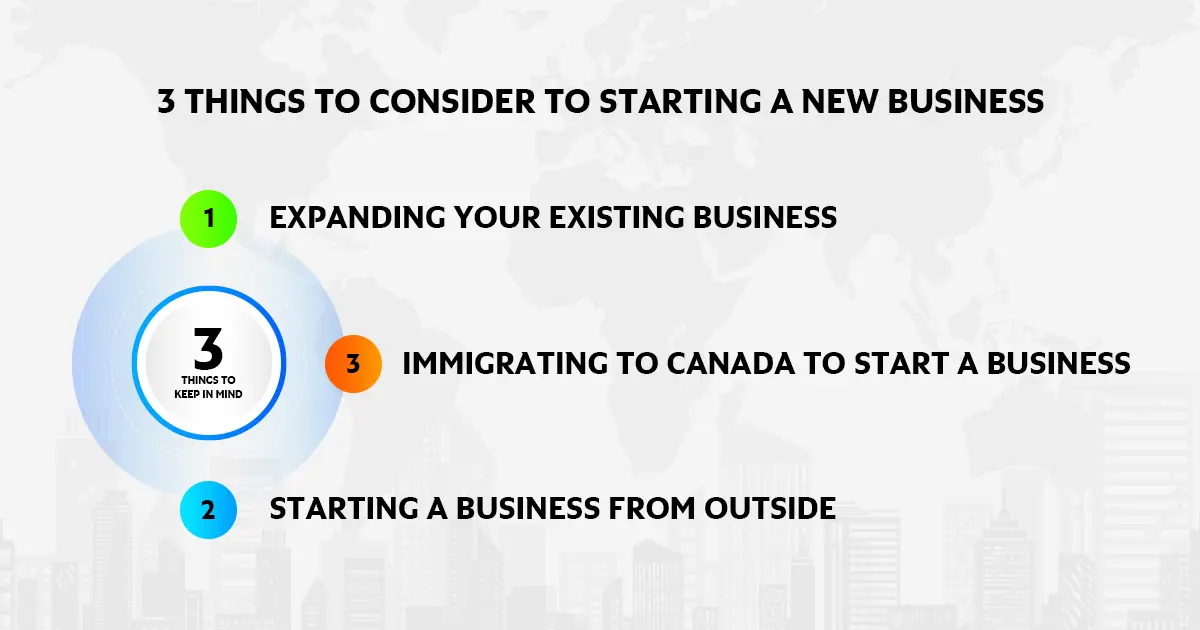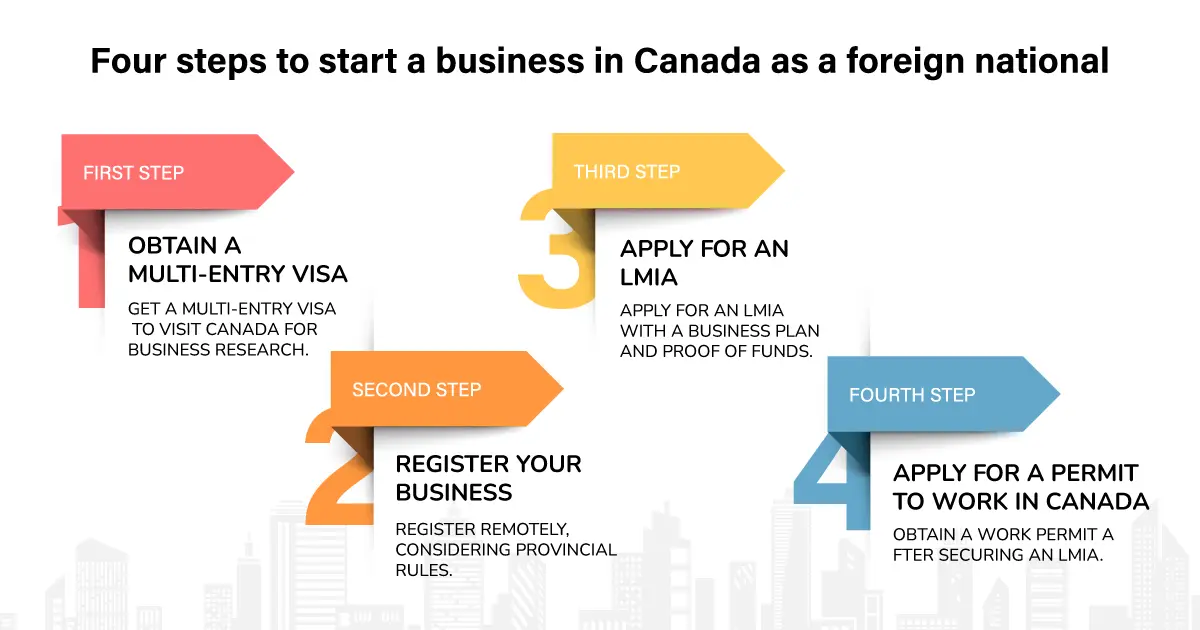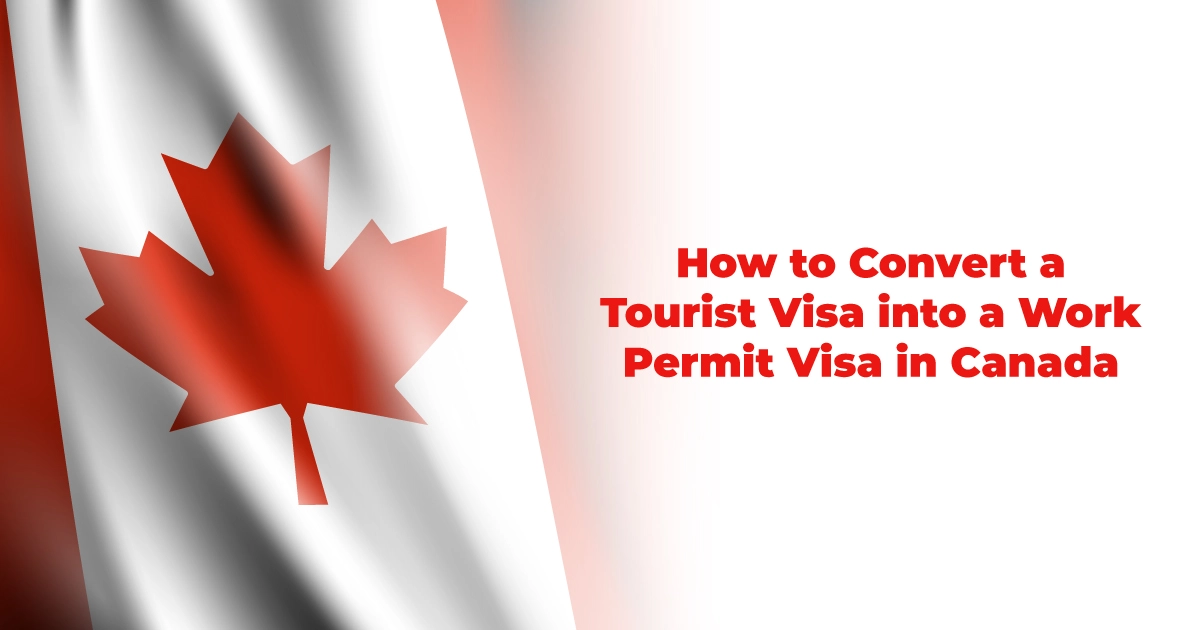Canada’s business culture, renowned for its inclusivity and respect for diversity, reflects the nation’s broad commitment to equal opportunities across various backgrounds. This approach is supported by a communication style that emphasizes politeness and diplomacy, focusing on agreement rather than conflict.
Canadian Business: Balancing Work, Tech, and Regulation
Canadian companies strongly advocate for a work-life balance, evident in their flexible working arrangements and supportive family policies like generous parental leave.
Technological adeptness is another hallmark, with rapid adoption across sectors such as digital media and IT enhancing efficiency and supporting remote work setups.
Moreover, a clear regulatory framework creates a stable, fair, and competitive business environment, supported by government incentives in technology and sustainable industries.
Looking ahead, a common question emerges: “Can a Foreigner Start a Business in Canada?” As Canadian business culture evolves amidst globalization and technological innovation, there’s a growing emphasis on integrating diverse international practices.
Sustainability will move to the forefront, with heightened corporate responsibility towards environmental concerns shaping future strategies. Additionally, the surge in technological advancements like AI and clean tech is set to revolutionize operational efficiencies and productivity.
What things to know as a newcomer to start a business in Canada?
If you are a newcomer or foreigner planning to engage in business in Canada, there are several key aspects to understand that will help you understand the Canadian business landscape effectively.
Here is what you should know if you have a question in mind like can a foreign start a business in Canada or not:
- Cultural Sensitivity and Diversity: Canada is highly diverse, with a workforce that includes people from various cultural, religious, and ethnic backgrounds. Being culturally sensitive and open to different perspectives is crucial in fostering inclusive business relationships.
- Communication Style: Canadians tend to be polite and indirect in their communication. It is important to practice tact and diplomacy in business discussions. Direct confrontation is generally avoided, and emphasis is placed on constructive feedback and consensus-building.
- Punctuality: Being on time for meetings and appointments is highly valued in Canadian business culture. It is seen as a sign of respect and professionalism.
- Business Etiquette: Business attire in Canada can vary from business casual to formal, depending on the industry and the occasion. It is advisable to research or inquire ahead of an engagement to choose appropriate attire. Exchanging business cards is a common practice and should be done with respect.
- Legal and Regulatory Framework: Understanding Canada’s legal and business regulations is vital. This includes being aware of the rules that govern business operations, labor laws, taxation, and compliance regulations specific to your industry.
- Work-Life Balance: Canadian companies generally value a healthy work-life balance. This is evident from policies on working hours, vacation entitlements, and workplace flexibility. Respecting this balance in your own practices and in your expectations of others is important.
- Language: While English is the primary language of business across most of Canada, French is predominant in Quebec and other parts of the country. In some cases, offering bilingual services can be beneficial and is highly appreciated.
- Networking: Building a local network can be immensely beneficial in Canada. Canadians place a high value on trust and relationships in business dealings, so attending networking events, seminars, and workshops can help in establishing connections.
- Economic Sectors: Canada’s economy is diverse. Key sectors include natural resources, manufacturing, services, technology, and healthcare. Knowing the major industries in the region where you plan to do business can provide insights into market dynamics and opportunities.
- Support for Entrepreneurs and Businesses: Canada offers various programs and incentives for businesses, including grants, loans, and tax benefits, especially for startups and businesses investing in research and development or sustainability. It is worthwhile to explore these options.
- Weather Considerations: The Canadian climate varies widely across the country and can impact business operations, especially in industries like construction and transportation. Being prepared for weather conditions and understanding their implications can be crucial.
Being aware of these aspects will help you adapt to the Canadian business environment more smoothly and ensure your interactions and transactions are successful and respectful of local customs and expectations.
Three Approaches to Starting a Business in Canada as a Foreigner

There are various strategies you can adopt to start a business in Canada even if you are not a resident. Some of these methods might not require your physical presence in Canada, although they may necessitate the involvement of a Canadian citizen or permanent resident.
1. Expanding Your Existing Business into Canada
If you already operate a business elsewhere and wish to expand into Canada, setting up a branch or subsidiary is a relatively direct approach for non-residents.
While Canadian citizenship or permanent residency isn’t mandatory, you will typically need a Canadian partner or associate. For businesses aiming to operate across multiple provinces or territories, registration as an extra-provincial corporation in each region is required.
Provinces like Ontario mandate that non-residents appoint an Agent for Service—either a Canadian citizen or permanent resident over 18, or a corporation based in the province—to register as an extra-provincial corporation.
2. Starting a Business from Outside of Canada
Launching a new venture in Canada from abroad is feasible under the Investment Canada Act, which regulates non-Canadian business owners establishing or acquiring Canadian businesses.
You can manage the business remotely, but generally, a local Canadian director is necessary. Additionally, each province and territory has its own regulations, which often require Canadian citizens or permanent residents to hold at least partial ownership.
British Columbia is an exception, permitting 100% foreign ownership under certain conditions.
3. Immigrating to Canada to Start a Business
Immigrating with the intent to start a business offers two primary pathways:
Start-Up Visa Program: This program supports immigrant entrepreneurs who intend to live in Canada and start innovative businesses that can generate jobs for Canadians and compete globally.
To apply, you must meet certain requirements, including having a qualifying business idea, meeting Canadian language standards, and possessing sufficient settlement funds.
If planning to settle in Quebec, specific regional requirements apply. Support from a designated organization is also required to apply for this visa.
Self-Employed Persons Program: This program is tailored for those looking to establish businesses in arts, entertainment, or sports.
Eligibility criteria include having relevant experience and intending to contribute significantly to Canada’s cultural or athletic life. Prospective applicants such as actors, musicians, and athletes are evaluated based on their experience, education, age, language skills, and adaptability, along with mandatory medical and security checks.
These pathways provide non-residents with flexible options to enter Canada’s business landscape, depending on their current situation, business goals, and personal preferences for relocation.
Four steps to start a business in Canada as a foreign national
Obtain a multi-entry visa
If you are contemplating where in Canada to establish your business but have not settled on a location yet, consider applying for a multi-entry visa first. This visa permits unlimited entries and exits from Canada for up to ten years, which is ideal if you need to visit several times to conduct thorough research and scout for the ideal business site before finalizing your decision.
Additionally, it is wise to explore other visa options you might qualify for and to acquaint yourself with the requirements for becoming a Canadian citizen.
Register your business
You can register your business in Canada from abroad without needing to be physically present. However, some areas require a Canadian citizen or permanent resident as a director for registration, though this director does not need to hold equity in your company.
Note that director responsibilities may include liabilities, such as in federal incorporations in Ontario, where 25% of directors must meet certain requirements.
For provincial incorporations, Ontario, Alberta, and British Columbia do not mandate a resident director, but an in-province address is necessary. In Alberta and British Columbia, if you are not local, you will need to appoint an incorporator or an agent residing in the province.
British Columbia stands out as it permits 100% foreign-owned corporations, making it a prime choice if you prefer not to involve a Canadian director. Additionally, consider the varying corporate tax rates in each province, as these will impact your business. Thorough research on provincial and federal tax implications is essential to choosing the best location for your business.
Apply for an LMIA
Registering your business in Canada is just the beginning; you can not start operating immediately after. You will need to secure a Labour Market Impact Assessment (LMIA), which evaluates the effect of your business on the Canadian labor market. The LMIA ensures that your operations won’t negatively impact employment opportunities for Canadian citizens or permanent residents.
To apply for an LMIA, you must submit a comprehensive business plan demonstrating your intent to hire at least one Canadian citizen or permanent resident upon starting your business. Additionally, you will need to prove to the LMIA authorities that you have the financial means to support yourself, your family, and your business.
Apply for a permit to work in Canada
After securing a positive LMIA, you are eligible to apply for a work permit, which is essential for conducting business in Canada and distinct from a visa. The work permit application process can span several months. However, if you possess a Temporary Resident Visa or a Visitor Visa for the United States, you might have the option to apply for a Canadian work permit directly at the border.
Given the complexity and duration of visa and work permit applications, considering an immigration representative might be beneficial. While their assistance won’t increase your chances of approval, it can help avoid paperwork errors that potentially delay the process.
Tips to Start a Business in Canada
Here is a summarized guide to starting a business in Canada as a foreigner:
- Embrace the Culture: Understanding local culture is crucial for effectively marketing your business. Engage with the community through local groups, volunteer activities, or business organizations to learn about potential customers’ buying behaviors.
- Build Your Credit Score: Establishing a good credit score is important in Canada, especially for securing business loans. Start by obtaining a Canadian credit card, use it responsibly, and aim to build a viable credit score within six months.
- Find a Mentor: A mentor with local business experience can provide valuable guidance. Numerous organizations in Canada offer support in connecting entrepreneurs with suitable mentors.
- Get Financially Prepared: Ensure you have sufficient funds to cover personal and business expenses while your business gains traction. It is recommended to have at least six months’ worth of living expenses saved up.
By understanding the local culture, establishing a good credit score, finding a mentor, and securing adequate financial reserves, you can overcome the complexities of starting a business in Canada more effectively. This approach will help set the foundation for a successful enterprise, especially when considering the question, can a foreigner start a business in Canada?







